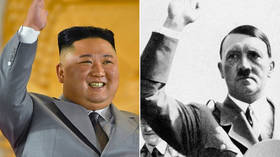Kim Jong-un’s sister may be silent, but she's not gone… she’ll be back when North Korea wants to show a tough side again
Western media are suggesting Kim Yo-jong has been replaced in the North Korean hierarchy by a popular singer. But she hasn’t been marginalised – this is all down to how the country wants to present itself at the moment.
On Thursday, the Times of London reported that Kim Yo-jong, the younger sister of North Korean leader Kim Jong-un, had seemingly been marginalised from the ‘inner circle’ of the country’s leadership.
Citing her absence from recent public appearances, the newspaper explored the apparent rival presence of a popular singer in North Korea, Hyon Song-wol, who has been more prominent. She attended the country’s military parade earlier this month to commemorate 75 years of the Workers’ Party of Korea.
But is there really a story to be had here? The Western media, and in particular the British press, are notorious for making unverified, speculative claims about North Korea, which often come from insubstantial or unreliable sources.
After all, earlier this year, Western papers were telling the world that Kim Jong-un was either dead or severely ill, neither of which turned out to be true. Yet, the eccentric and mysterious world of North Korea continues to be a magnet for the most enthralling geopolitical gossip. And even the most minor occurrence or changes conjure up feverish speculation.
Even within this environment, Kim Yo-jong has been a subject of heavy media interest. Having risen to prominence in North Korea’s elite as the supreme leader’s sister and secured a position on the Politburo, she is viewed as a figure of primary importance and, being of the same family line, considered a potential successor to Kim Jong-un amid continued speculation about his health.
She has stamped her own brand on Pyongyang politics, featuring prominently in her brother’s summits with President Donald Trump and taking the lead in aggressive rhetoric towards South Korea. She announced the destruction of the Inter-Korean Liaison Office in Kaesong earlier this year. Given the opacity of the state, this has made analysts and commentators dissect every last detail about her.
So it is natural, given the media hysteria that surrounds North Korea, that when there is an apparent change to the frequency of her appearances or her role, the rumour mill cranks into life and speculation is ramped up.
Also on rt.com How much do we REALLY know about Kim Yo-jong, the outspoken sister of Kim Jong-un who’s now North Korea’s No. 2?This is often projected onto scenarios of hypothetical power struggles within the ‘North Korean court’, prompting the question whether she has fallen out of favour. Media appearances are watched carefully, and even if many of these analyses are over the top, such observations are well grounded. Nothing in North Korea’s own state media is coincidental or, for that matter, apolitical. Every message and public appearance is assumed to have symbolic meaning.
The question, however, is: what political message is being sent? Analysts argue that who appears in public and who does not is about who is in favour – and who isn’t – with Kim Jong-un. Hence the latest speculation about Kim Yo-jong.
It’s more complex than that, though. It’s not always about personal prominence. Often, it is more about the individual’s personal qualities and the political message to the wider world (as opposed to simply within North Korea itself) that the country wants to send out. People’s personal brands matter, and Pyongyang is very careful to orientate its messaging to reflect its diplomatic signalling.
That is what could be significant in this case. Over the past year, Kim Yo-jong has developed a reputation. Her politics and messaging have increasingly been associated with a hard-line stance, especially when it comes to South Korea. She has demonstrated an unwillingness to pursue diplomacy or compromise.
This stance is carefully calibrated to provide some distance from – but is on behalf of – Kim Jong-un, as the messages would appear much more extreme if they came from him.
On the other hand, Hyon, as a lead singer in the popular Moranbong Band, is not an icon of war but a human symbol of the country’s own ‘soft power’ diplomacy and thus its cultural traits. She is the ‘friendly face’ of North Korea, if you like.
How individuals are used is all about how North Korea chooses to present itself and what it wants to emphasize, and not because, as Western media suggests, they are locked in an internal power struggle.
Kim Yo-jong is not necessarily being marginalised. But her particular portfolio is rightly being downplayed at the moment as the country, while still emphasizing nuclear deterrence, is looking to dilute its reputation for belligerence.
At present, Kim Jong-un’s focus has shifted towards personal statesmanship and perhaps leaving a door open for dialogue. Kim Yo-jong will absolutely be back when her brother picks her moment, and that just isn’t right now.
Think your friends would be interested? Share this story!
The statements, views and opinions expressed in this column are solely those of the author and do not necessarily represent those of RT.















